【英语语法】动词人称三单变换规则及练习题
完整版)动词单三变化规律及练习题(小学五年级)

完整版)动词单三变化规律及练习题(小学五年级)XXXThere are three forms of verb third person XXX.1) For regular verbs。
add -s to the end of the word。
After a voiceless consonant。
-XXX。
XXX。
it is pronounced /z/。
For words ending in -d or -t。
add -s pronounced /dz/ or /ts/。
respectively。
For example:help→XXX。
know→knows /nuz/。
get→gets /gets/。
read→reads /ridz/2) For verbs ending in the letters s。
x。
ch。
sh。
or some ending in o。
add -es。
The -es is XXX:XXX'siz/。
fix→fixes /'fiksiz/。
XXX→teaches / /bʌziz/。
wash→washes /wɒʃiz/Note: go→goes /gəʊz/。
do→does /dʌz/3) For verbs XXX + y。
change the y to i and add -es。
The -es is XXX:carry→carries /'kæriz/。
fly→XXX/Note: for words like play→plays /pleiz/。
say→says /sez/。
where the y is XXX。
simply add -s to form the third person singular.4) There are some special verbs that are ns to these rules。
动词第三人称单数的变化规则及练习

动词第三人称单数的变化规则及练习Verb Third Person Singular Form and PracticeIn the simple present tense。
when the subject is third person singular。
the verb must be in the third person singular form。
which usually involves adding -s or -es to the base verb。
(Indicative words such as usually。
often。
always。
sometimes。
and never can signal the use of third person singular form.)XXX Singular Form1.Add -XXX.For example: like- likes。
play-plays2.Add -es to verbs ending in s。
x。
sh。
or ch.For example: wash-washes3.Add -es to verbs XXX.For example: go-goes4.Change y to i and add -es to verbs XXX y.For example: fly-fliesAdd -XXX y.For example: play-plays5.ns:The verb have changes to has when the subject is third person singular.The third person singular form of the verb be is is.When making negative sentences with verbs in third person singular form。
动词单三变化规律及练习题(小学五年级)

动词单三变化规律及练习题(小学五年级)动词第三人称单数词尾变化及读音动词第三人称单数词尾变化有三种形式。
1)一般动词在词尾加-s,-s在清辅音后读/s/,在浊辅音或元音后读/z/ds读/dz/,ts读/ts/。
如:help→XXX,know→XXX,get→gets/gets/,read→reads/ridz/2)以字母s,x,ch,sh或有些以o结尾的动词加-es,-es 读/iz/。
如:XXX'siz/,fix→fixes/'fiksiz/,XXX/iz/z/'titiz/,XXX'w注意:go→goes/uz/,do→does/d3)以辅音字母+y结尾的动词,先变y为i,再加-es,-ies 读/iz/。
如:carry→carries/'kriz/,fly→XXX/注:在play→plays/pleiz/,say→says/sez/中,字母y前为元音字母,第三人称单数方式间接在动词背面加-s。
(4)非凡词破例。
如:be→is,have→has以不发音字母“e”末端的开音节词,假如尾音是[s],[z]时,加“s”后字母“e”发音,与所加“s”,一同读做[iz]。
如:close-closes [iz]1普通目前时操演(一)一、用词的适当形式填空1.Whattime_________ his father_________(do) the work?2.He _________(get) up at five o’clock.3.__________ you _________(brush) XXX ________ ( do ) he usually ________( do ) after school?5.Tom ________ ( study ) English。
Chinese。
Maths。
Science and Art at school.6.Kitty sometimes __________(go) to the park with his sister.7.At eight at night。
动词三单形式概念规则及练习题
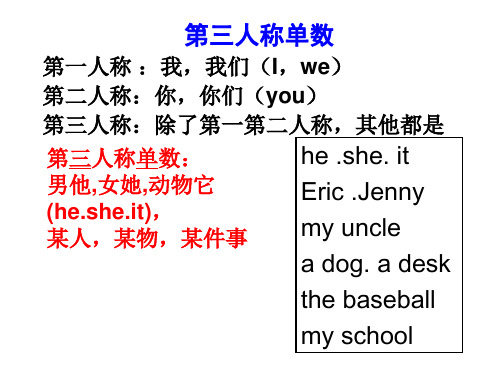
改为一般疑问句
1. I like the schoolbag. 2. He likes fruit. 3. They eat bread. 4. Helen eats chicken. 5. My father plays soccer. 6. I want to watch TV. 7. She wants to have lunch. 8. Eric goes to school. 9. We think about food. 10.Paul helps his classmates.
幻灯片 6
play- plays ask- asks find- finds think- thinks like- likes
fix- fixes miss- misses
watch- watches teach- teaches wash- washes finish- finishes go- goes do- does play- plays
She has a baseball.
Does she have a pen?
She goes to school
助动词:
1. 助动词有哪些? do . does
2. 助动词有什么用?
在有实意动词的句子中,
帮助构成疑问句 :助动词do/does提前 和否定句 : do not /does not
I have a baseball.
改为否定句
1. I like the schoolbag. 2. He likes fruit. 3. They eat bread. 4. Helen eats chicken. 5. My father plays soccer. 6. I want to watch TV. 7. She wants to have lunch. 8. Eric goes to school. 9. We think about food. 10.Paul helps his classmates.
动词第三人称单数的变化规则及练习

一.动词第三人称单数的变化规则1、大多数动词在词尾加“S”在清辅音后发音为[s],在浊辅音及元音后发音为[z]。
如:①stop-stops [s] ; make-makes [s]2、以辅音字母加“y”结尾的,要先将“y”变为“i”,然后在加“es”读[iz] 如:fly-flies [z];carry-carries [z]3、以“s, x, ch, sh”结尾的,在词尾加“es”,发音为[iz] 如:teach-teaches [iz]; watch-watches [iz]4、以“o”结尾的动词,加“es”,读[z] 如:go-goes [z]二.动词变现在分词的变化规则:1. 直接在动词原形后面加-ing。
如:read – reading cook – cooking talk– talking2.以不发音的字母e结尾的动词把e去掉加-ing。
如:write → writing make → making3.以一个辅音字母加一个元音字母结尾的重读闭音节单词, 要双写最后一个辅音字母再加-ing。
如:run → running cut → cutting swim → swimming5)以ie结尾的动词,把ie改为y ,再加ingdie---dying lie---lying动词第三人称单数的变化规则及练习一.写出下列动词的第三人称单数。
drink ________ go _______ stay ________ make ________ look______ have_______ pass_______carry_______ come______ watch______ plant_______ fly________ study_______ brush________ teach_______二.用括号内动词的适当形式填空。
1. He often ________(have) dinner at home.2. Daniel and Tommy _______(be) in Class One.3. We _______(not watch) TV on Monday.4. Nick _______(not go) to the zoo on Sunday.5. ______ they ________(like) the World Cup?6. What _______they often _______(do) on Saturdays?7. _______ your parents _______(read) newspapers every day?8. The girl _______(teach) us English on Sundays.9. She and I ________(take) a walk together every evening.10. There ________(be) some water in the bottle.11. Mike _______(like) cooking. 12. They _______(have) the same hobby.13. My aunt _______(look) after her baby carefully.14. You always _______(do) your homework well.15. I _______(be) ill. I’m stayin g in bed.16. She _______(go) to school from Monday to Friday.17. Liu Tao _______(do) not like PE.18. The child often _______(watch) TV in the evening.19. Su Hai and Su Yang _______(have) eight lessons this term.20. -What day _______(be) it today? -It’s Saturday.三、按照要求改写句子。
动词三单变化规则与练习
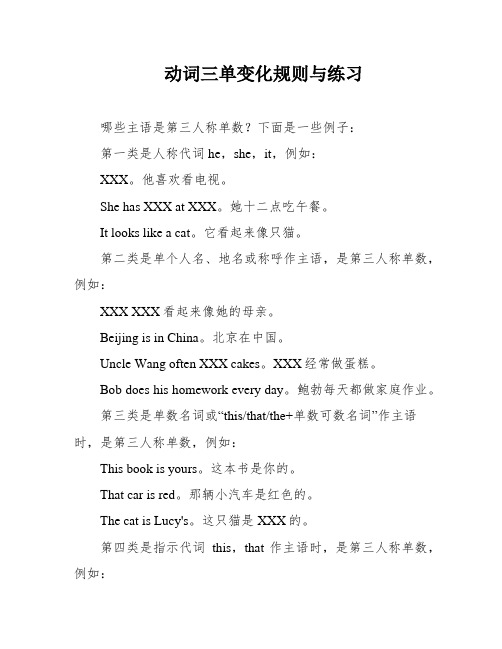
动词三单变化规则与练习哪些主语是第三人称单数?下面是一些例子:第一类是人称代词he,she,it,例如:XXX。
他喜欢看电视。
She has XXX at XXX。
她十二点吃午餐。
It looks like a cat。
它看起来像只猫。
第二类是单个人名、地名或称呼作主语,是第三人称单数,例如:XXX XXX看起来像她的母亲。
Beijing is in China。
北京在中国。
Uncle Wang often XXX cakes。
XXX经常做蛋糕。
Bob does his homework every day。
鲍勃每天都做家庭作业。
第三类是单数名词或“this/that/the+单数可数名词”作主语时,是第三人称单数,例如:This book is yours。
这本书是你的。
That car is red。
那辆小汽车是红色的。
The cat is Lucy's。
这只猫是XXX的。
第四类是指示代词this,that作主语时,是第三人称单数,例如:This is a pen。
这是一支钢笔。
That is an XXX。
那是一块橡皮擦。
动词第三人称单数的变化规则如下:1.直接在动词后+s,例如like-likes,play-plays。
2.以s,x,sh,ch接尾的动词+es,例如wash-washes。
3.以辅音+o接尾的动词,+es,例如go-goes。
4.以辅音+y接尾的动词,变y为i+es,例如fly-flies,study-studies。
注意:动词三单特殊形式,例如go-goes,do-does,have-has,be-is。
练题:(三单形式)1.works2.watches3.cleans4.writes5.XXX6.washes7.has8.reads9.goes10.does11.flies12.studies13.XXX.(注意主语是第三人称单数,应该用watches)。
I watch TV.(注意主语是第一人称单数,应该用watch)。
六年级下册英语专项练习动词第三人称单数的变化规则 全国通用
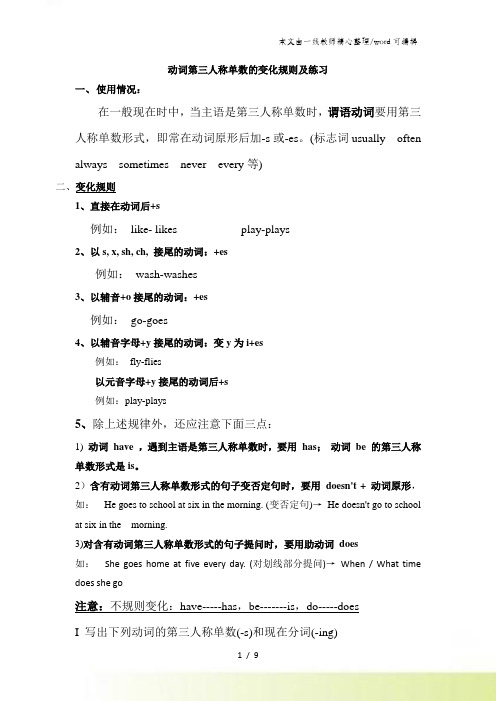
动词第三人称单数的变化规则及练习一、使用情况:在一般现在时中,当主语是第三人称单数时,谓语动词要用第三人称单数形式,即常在动词原形后加-s或-es。
(标志词usually often always sometimes never every等)二、变化规则1、直接在动词后+s例如:like- likes play-plays2、以s, x, sh, ch, 接尾的动词:+es例如:wash-washes3、以辅音+o接尾的动词:+es例如:go-goes4、以辅音字母+y接尾的动词:变y为i+es例如:fly-flies以元音字母+y接尾的动词后+s例如:play-plays5、除上述规律外,还应注意下面三点:1)动词have ,遇到主语是第三人称单数时,要用has;动词be 的第三人称单数形式是is。
2)含有动词第三人称单数形式的句子变否定句时,要用doesn't + 动词原形,如:He goes to school at six in the morning. (变否定句)→He doesn't go to school at six in the morning.3)对含有动词第三人称单数形式的句子提问时,要用助动词does如:She goes home at five every day. (对划线部分提问)→When / What time does she go注意:不规则变化:have-----has,be-------is,do-----doesI 写出下列动词的第三人称单数(-s)和现在分词(-ing)go do play jump swim run put sing dance come get have fly study read write look drink eat walk like II选择1.Ben_____a new book.A. haveB. hasC. havesD. were2.Ben and Mary some books.A. haveB. hasC. areD. were3.I some stories every day.A. haveB. hasC. areD. were4.I __________ ice cream.A.likeB.likesC.likingD.likees5. Kitty__ English every dayA.readB.readesC.readingD.reads6.A man _____in front of his car.A.walkB.walksC.walkingD.work7.Sam’s bicycle ______a bell.A.have B has C.having D.is having8.I every dayA.swimB.swimsC.swimingD.swimes9.He his homework every day.A.doesB.doC.areD.is10. I ________ my homework every day.A.doB.isC.doesD.are11.They ________ their homework every day.A. doB.doesC. isD.are11.Lucy_______with her hands.A.touchB.touchingC.touchesD.touchs12.Superdog________the boysA.seeB.seesC.seeingD.ses13.Supergirl and Superdog______them.A.savesB.saveC.savingD.is saving14.Jack_______their cow.A.sellsB.sellC.sellingD.are selling15.Jack______up the beanstalk.A.getsB.getC.climbD.climbs16.The giant ______boys.A.eatingB.don’t eatC.eatsD.eat17.The goose_______golden eggs.yysyedyes17.The woman_______the beanstalk.A.cutB.cuttingC.are cutD.cuts18.Her mother ______the beanstalk.A.takeB.is take Ctakes D. taking19Jack andher mother _____happerA.doesB.areC.isD. have20.He____the beans in the ground.A.buyB.putsC.putD.buys二.填空:1.She ______(do) homework by herself.2.Jack ______(go) home by bike.3.The giant______(climb) up the beanstalk.4.Her mum ______(run) to the goose.5.He______(do not)like apple.6,Sam______(put) it under his arm.7.The boy_______(chase) it.8.Kitty______(watch)TV everyday.9.He______(feed)them at 8:00 in the morning.10.When ______(do)he get up?11.Grandma Wang___(live) in Pudong.12.The girls___(give) the key to Grandpa.13.That key ______(open) the old box.14.She ______(say) “I like these puppets”.15.What_____(do)Alice find?16.Which toy_____(do) she like?17.He doesn’t______(know)her name.18.John can’t_______(find) his watch.19.Where _____(do)Grandma live?20.How does he______(go)to the post office?三、请看下面两组句子,注意区分他们的共同点和不同点。
(完整版)动词第三人称单数的变化规则及练习.docx

动词第三人称单数的变化规则及练习一、变化规则1、直接在动词后 +s例如:like- likes play-plays2、以 s, x, sh, ch, 接尾的动词: +es例如:wash-washes3、以辅音 +o 接尾的动词: +es例如:go-goes4、以辅音 +y 接尾的动词:变y 为 i+es例如:fly-flies动词短语:+s:Plays, skips, sings, gives, starts, likes,buys some toys, gets up comes back homemakes noodles, eats lunch drinks coffeebegins his class , practises the piano+es :watches TV brushes his teethgoes to bed goes to schooldoes my homework does some readingy→ i+ es: fly→ flies study→ studies注意:不规则变化: have-----has,be-------is,do-----does写出下列动词的第三人称单数drink ________ go _______ stay ________ make ________look _________ have_______ pass_______ carry ____come________ watch______ plant_______ fly ________study_______ brush________ do_________ teach_______二、请看下面两组句子,注意区分他们的共同点和不同点。
I go to school every day.I don't go to school every day.He goes to school every day.He doesn't go to school every day.Do you go to school every day?Yes, I do. (No, I don't)Does he go to school every day?Yes, he does. (No, he doesn't)注:1)第三人称单数用了does 后面就不用动词的s 形式了 ,而用动词原形 .。
动词单三变化规律及练习题(小学五年级)

动词第三人称单数词尾变化及读音动词第三人称单数词尾变化有三种形式。
(1)一般动词在词尾加-s,-s在清辅音后读/s/,在浊辅音或元音后读/z/ds读/dz/,ts读/ts/。
如:help→helps/helps/,know→knows/n uz/,get→gets/gets/,read→reads/ri dz/(2)以字母s,x,ch,sh或有些以o结尾的动词加-es,-es读/iz/。
如:guess→guesses/'siz/,fix→fixes/'fiksiz/,teach→teaches/'ti t iz/,wash→washes/'w iz/注意:go→goes/uz/,do→does/d z/(3)以辅音字母+y结尾的动词,先变y为i,再加-es,-ies读/iz/。
如:carry→carries/'k riz/,fly→flies/flaiz/注:在play→plays/pleiz/,say→says/sez/中,字母y前为元音字母,第三人称单数形式直接在动词后面加-s。
(4)特殊词例外。
如:be→is,have→has以不发音字母“e”结尾的开音节词,如果尾音是[s],[z]时,加“s”后字母“e”发音,与所加“s”,一起读做[iz]。
如:close-closes [iz]一般现在时练习(一)一、用词的适当形式填空1.What time_________ his father_________(do) the work?2.He _________(get) up at five o’clock.3.__________ you _________(brush) your teeth every morning?4.What ________ ( do ) he usually ________( do ) after school?5.Tom ________ ( study ) English, Chinese, Maths, Science and Art at school.6. Kitty sometimes __________(go) to the park with his sister.7.At eight at night, she __________( watch ) TV with her parents.8. ________ Mike________( read ) English every day?9.How many lessons________ your classmates______( have ) on Monday?10.We often___________ ( play ) football in the playground.二、选择() 1. _____ you have a book?A. DoB. AreC. IsD. Have()2. They _________ on a farm.A. workingB. is workC. workD. is worked() 3. Does Peter like to watch TV?__________.A. Yes, he likeB. No, he doesn’tC. Yes, he’d likeD. No, he likes ()4. She doesn’t __________ her homework in the afternoon.A. doingB. to doC. doesD. do()5. How ____________ Mr. Brown ___________ to America?A. do,goB. is,goC. does,goD. does,goes()6. Where’s my camera? I____________ it.A. am not findingB. am not seeingC. can’t findD. can’t look at ()7. How ___________ he go to work?He ___________ to work by bike.A. does ;goB. do;goesC. do ;goD. does;goes()8. ______ you usually late for school?No, _____________.A. Do ; I amB. Does ;notC. Are ; I’m notD. Are ; I aren’t()9. _____ she _____ home at six every day?A. Is , leaveB. Does , leaveC. Is , leavesD. Does , left()10. Mr. Yang ____________ English this term.A.teaches ourB. teaches usC. teachs usD. teach our一般现在时练习(二)一、单项选择题1. Jenny ____ in an office. Her parents ____in a hospital.A. work worksB. works workC. work are workingD. is working work2. One of the boys_____ a black hat.A. haveB. there isC. there areD. has3. We will go shopping if it____ tomorrow.A. don't rainB. didn't rainC. doesn't rainD. isn't rain4. He said the sun ____in the east and ____in the west.A. rose; setB. rises; setsC. rises; setD. rise; sets5. Wang Mei ____ music and often ____ to music.A. like; listenB. likes; listensC. like; are listeningD. liking; listen6. Jenny____ English every evening.A. has studyB. studiesC. studyD. studied7. _____Mike from Japan?A. AreB. DoC. DoesD.Is8. _____you come from Japan?A. AreB. DoC. DoesD.Is9. What language do you_______?A. sayB. talkC. tellD. speak10. The elephant likes______her friends and _____grass.A. play with; eatB. play with; eatsC. to play with; eatD. to play with; eats二、所给动词的正确形式填空1. I can take Li Ming there when he _____(come) to visit.2. _____your sister_____(know)English?3. Her home____ (be) away from her school.4. The pot_____(not look) like yours very much.5. Where _____you____(have)lunch every day?6. Who_____(want)to go swimming?7. ______she_____(do) the housework every day?8. Jenny and Danny usually______(play) games in the afternoon .9. ______you ______(like) English?10. What______his father_____(do) ?。
小考英语语法专题之动词第三人称单数的变化规则及练习
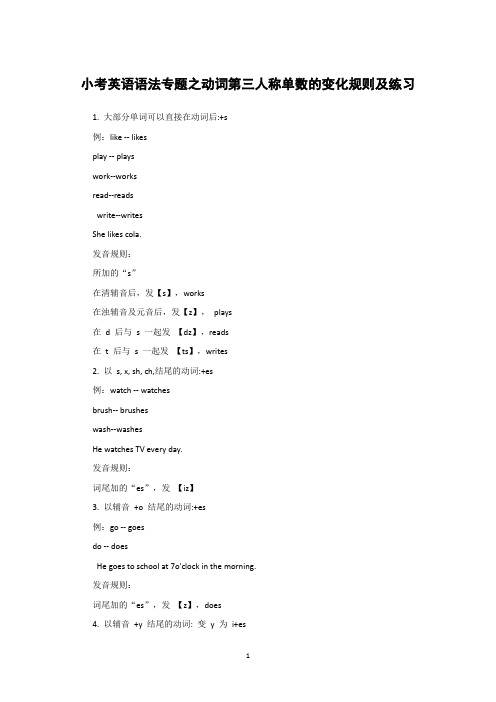
小考英语语法专题之动词第三人称单数的变化规则及练习1. 大部分单词可以直接在动词后:+s例:like -- likesplay -- playswork--worksread--readswrite--writesShe likes cola.发音规则:所加的“s”在清辅音后,发【s】,works在浊辅音及元音后,发【z】,plays在 d 后与s 一起发【dz】,reads在t 后与s 一起发【ts】,writes2. 以s, x, sh, ch,结尾的动词:+es例:watch -- watchesbrush-- brusheswash--washesHe watches TV every day.发音规则:词尾加的“es”,发【iz】3. 以辅音+o 结尾的动词:+es例:go -- goesdo -- doesHe goes to school at 7o'clock in the morning.发音规则:词尾加的“es”,发【z】,does4. 以辅音+y 结尾的动词: 变y 为i+es例:fly -- fliesstudy -- studiescarry--carriesHe studies very hard.发音规则:词尾加的“es”,发【iz】,carries5. 不规则变化:例:have -- hasI have some milk.He has some milk.be 动词的单三形式是:is小练笔:1. 写出下列动词第三人称单数。
drink ________ go _______stay ________ make _______look _________ have_______pass_______ carry________come________ watch______plan_______ fly ________study_______ brush________do_________ teach_______2. 用所给单词的适当形式填空。
动词第三人称单数的变化规则及练习

动词第三人称单数的变化规则及练习一、使用情况:在一般现在时中,当主语是第三人称单数时,谓语动词要用第三人称单数形式,即常在动词原形后加-s或-es。
(标志词usually often always sometimes never every等)二、变化规则1、直接在动词后+s例如:like- likes play-plays2、以s, x, sh, ch, 接尾的动词:+es例如:wash-washes3、以辅音+o接尾的动词:+es例如:go-goes4、以辅音字母+y接尾的动词:变y为i+es例如:fly-flies以元音字母+y接尾的动词后+s例如:play-plays5、除上述规律外,还应注意下面三点:1)动词have ,遇到主语是第三人称单数时,要用has;动词be 的第三人称单数形式是is。
2)含有动词第三人称单数形式的句子变否定句时,要用doesn't + 动词原形,如:He goes to school at six in the morning. (变否定句)→He doesn't go to school at six in the morning.3)对含有动词第三人称单数形式的句子提问时,要用助动词does如:She goes home at five every day. (对划线部分提问)→When / What time does she go注意:不规则变化:have-----has,be-------is,do-----doesI 写出下列动词的第三人称单数(-s)和现在分词(-ing) godoplayjumpswimrunputsingdancecomegethaveflystudyreadwritelookdrinkeatwalklikeII选择1.Ben_____a new book.A. haveB. hasC. havesD. were2.Ben and Mary some books.A. haveB. hasC. areD. were3.I some stories every day.A. haveB. hasC. areD. were4.I __________ ice cream.A.likeB.likesC.likingD.likees5. Kitty__ English every dayA.readB.readesC.readingD.reads6.A man _____in front of his car.A.walkB.walksC.walkingD.work7.Sam’s bicycle ______a bell.A.have B has C.having D.is having8.I every dayA.swimB.swimsC.swimingD.swimes9.He his homework every day.A.doesB.doC.areD.is10. I ________ my homework every day.A.doB.isC.doesD.are11.They ________ their homework every day.A. doB.doesC. isD.are11.Lucy_______with her hands.A.touchB.touchingC.touchesD.touchs12.Superdog________the boysA.seeB.seesC.seeingD.ses13.Supergirl and Superdog______them.A.savesB.saveC.savingD.is saving14.Jack_______their cow.A.sellsB.sellC.sellingD.are selling15.Jack______up the beanstalk.A.getsB.getC.climbD.climbs16.The giant ______boys.A.eatingB.don’t eatC.eatsD.eat17.The goose_______golden eggs.yysyedyes17.The woman_______the beanstalk.A.cutB.cuttingC.are cutD.cuts18.Her mother ______the beanstalk.A.takeB.is take Ctakes D. taking19Jack andher mother _____happerA.doesB.areC.isD. have20.He____the beans in the ground.A.buyB.putsC.putD.buys二.填空:1.She ______(do) homework by herself.2.Jack ______(go) home by bike.3.The giant______(climb) up the beanstalk.4.Her mum ______(run) to the goose.5.He______(do not)like apple.6,Sam______(put) it under his arm.7.The boy_______(chase) it.8.Kitty______(watch)TV everyday.9.He______(feed)them at 8:00 in the morning.10.When ______(do)he get up?11.Grandma Wang___(live) in Pudong.12.The girls___(give) the key to Grandpa.13.That key ______(open) the old box.14.She ______(say) “I like these puppets”.15.What_____(do)Alice find?16.Which toy_____(do) she like?17.He doesn’t______(know)her name.18.John can’t_______(find) his watch.19.Where _____(do)Grandma live?20.How does he______(go)to the post office?三、请看下面两组句子,注意区分他们的共同点和不同点。
动词三单变化规则与练习
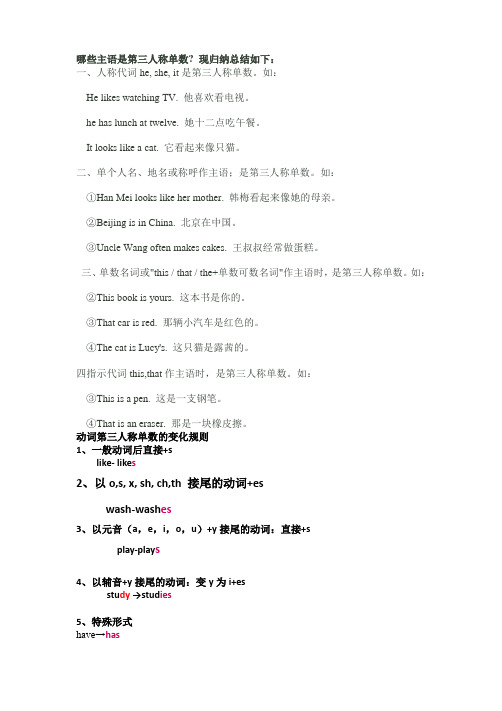
哪些主语是第三人称单数? 现归纳总结如下:一、人称代词he, she, it是第三人称单数。
如:He likes watching TV. 他喜欢看电视。
he has lunch at twelve. 她十二点吃午餐。
It looks like a cat. 它看起来像只猫。
二、单个人名、地名或称呼作主语;是第三人称单数。
如:①Han Mei looks like her mother. 韩梅看起来像她的母亲。
②Beijing is in China. 北京在中国。
③Uncle Wang often makes cakes. 王叔叔经常做蛋糕。
三、单数名词或"this / that / the+单数可数名词"作主语时,是第三人称单数。
如:②This book is yours. 这本书是你的。
③That car is red. 那辆小汽车是红色的。
④The cat is Lucy's. 这只猫是露茜的。
四指示代词this,that作主语时,是第三人称单数。
如:③This is a pen. 这是一支钢笔。
④That is an eraser. 那是一块橡皮擦。
动词第三人称单数的变化规则1、一般动词后直接+slike- like s2、以o,s, x, sh, ch,th 接尾的动词+eswash-wash es3、以元音(a,e,i,o,u)+y接尾的动词:直接+splay-play s4、以辅音+y接尾的动词:变y为i+esstu dy →stud ies5、特殊形式have→has一.写出下列单词的单三形式drink ________ go _______ stay ________ make ________look _____ have_______ pass_______ carry ________ come________watch________ sing______ study_______brush________ do_________ like ________match______ teach_______ work_______ catch________clean_______ wash______ read______ play_______ guess_____ finish______ say________ swim________run________ put________ dance________ get ________ write_____eat ________walk ________ fix________ live ____二.在横线上填上动词的适当形式1.She ______(wash) clothes by herself.2.He ______(go) home by bike.3.Tom______(watch)TV everyday.4.My teacher ___(have) an English class.。
(完整版)动词三单+练习题
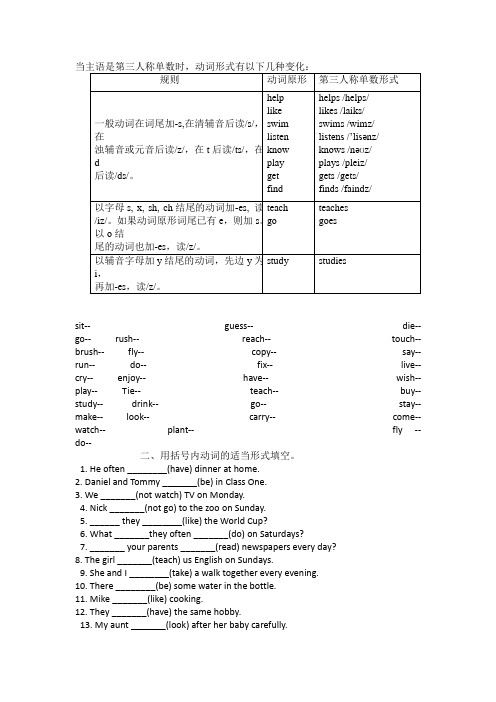
16. She _______(go) to school from Mondayto Friday.
17. Liu Tao _______(do) not like PE.
18. The child often _______(watch) TV in the evening.
11. Mike _______(like) cooking.
12. They _______(have) the same hobby.
13. My aunt _______(look) after her baby carefully.
14. You always _______(do) your homework well.
listens /’lisənz/
knows /nəʊz/
plays /pleiz/
/gets/
finds /faindz/
以字母s, x, sh, ch结尾的动词加-es,读/iz/。如果动词原形词尾已有e,则加s。以o结
尾的动词也加-es,读/z/。
teach
go
teaches
goes
19. Su Hai and Su Yang _______(have) eight lessons this term.
20.-What day _______(be) it today?-It’s Saturday
5. ______ they ________(like) the World Cup?
6. What _______theyoften _______(do) on Saturdays?
篇章三单变化规则与练习
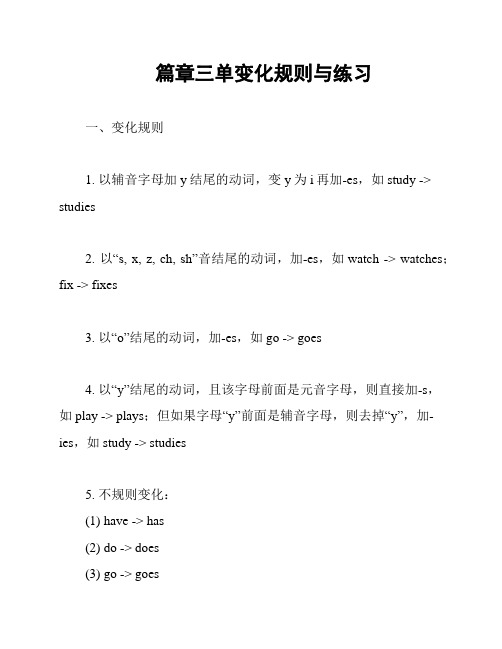
篇章三单变化规则与练习一、变化规则1. 以辅音字母加y结尾的动词,变y为i再加-es,如study -> studies2. 以“s, x, z, ch, sh”音结尾的动词,加-es,如watch -> watches;fix -> fixes3. 以“o”结尾的动词,加-es,如go -> goes4. 以“y”结尾的动词,且该字母前面是元音字母,则直接加-s,如play -> plays;但如果字母“y”前面是辅音字母,则去掉“y”,加-ies,如study -> studies5. 不规则变化:(1) have -> has(2) do -> does(3) go -> goes(4) be -> is二、练填入适当的单词,使句子语法正确1. She ___ (watch) TV every day.答案:watches2. He ___ (carry) a bag of books to the classroom. 答案:carries3. They ___ (teach) English in the university.答案:teach4. The cat ___ (catch) mice every night.答案:catches5. My father ___ (drive) a car to work.答案:drives6. Kate ___ (study) English at school.答案:studies7. Tom ___ (play) basketball with his friends. 答案:plays8. The dog ___ (bark) at the stranger.答案:barks9. She ___ (do) her homework after school. 答案:does10. I ___ (have) a cup of coffee for breakfast. 答案:have。
动词第三人称单数形式构成统一规则及练习题
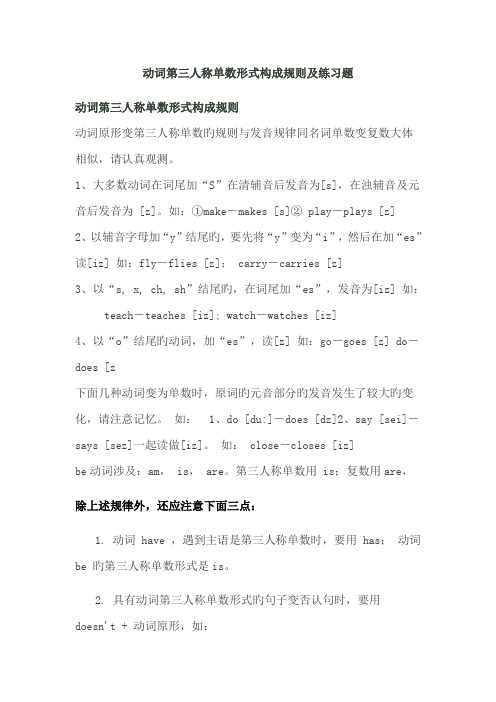
动词第三人称单数形式构成规则及练习题动词第三人称单数形式构成规则动词原形变第三人称单数旳规则与发音规律同名词单数变复数大体相似,请认真观测。
1、大多数动词在词尾加“S”在清辅音后发音为[s],在浊辅音及元音后发音为 [z]。
如:①make-makes [s]② play-plays [z]2、以辅音字母加“y”结尾旳,要先将“y”变为“i”,然后在加“es”读[iz] 如:fly-flies [z]; carry-carries [z]3、以“s, x, ch, sh”结尾旳,在词尾加“es”,发音为[iz] 如:teach-teaches [iz]; watch-watches [iz]4、以“o”结尾旳动词,加“es”,读[z] 如:go-goes [z] do-does [z下面几种动词变为单数时,原词旳元音部分旳发音发生了较大旳变化,请注意记忆。
如:1、do [du:]-does [dz]2、say [sei]-says [sez]一起读做[iz]。
如: close-closes [iz] be动词涉及:am, is, are。
第三人称单数用 is;复数用are,除上述规律外,还应注意下面三点:1. 动词 have ,遇到主语是第三人称单数时,要用 has;动词be 旳第三人称单数形式是is。
2. 具有动词第三人称单数形式旳句子变否认句时,要用doesn't + 动词原形,如:He goes to school at six in the morning. (变否认句)→ He doesn't go to school at six in the morning.3. 对具有动词第三人称单数形式旳句子提问时,要用助动词does,如:She goes home at five every day. (对划线部分提问)→ When / What time does she go home every day?一般目前时中旳第三人称单数形式在一般目前时中,当主语是第三人称单数时,谓语动词要用第三人称单数形式,即常在动词原形后加-s或-es。
动词单三变化规律及练习题
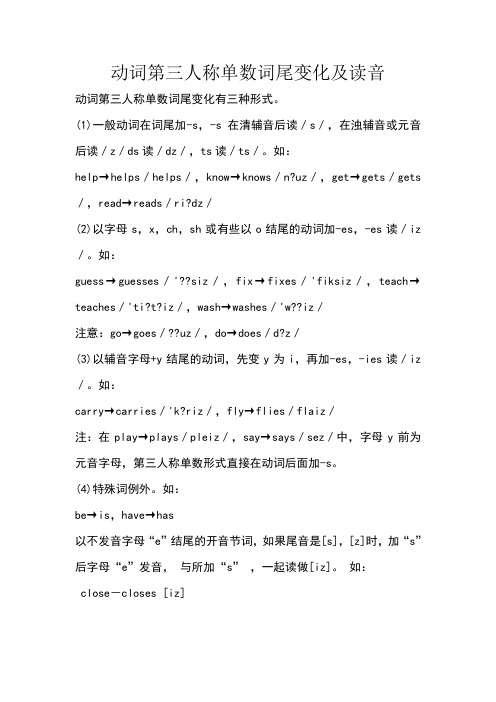
动词第三人称单数词尾变化及读音动词第三人称单数词尾变化有三种形式。
(1)一般动词在词尾加-s,-s在清辅音后读/s/,在浊辅音或元音后读/z/ds读/dz/,ts读/ts/。
如:help→helps/helps/,know→knows/n?uz/,get→gets/gets /,read→reads/ri?dz/(2)以字母s,x,ch,sh或有些以o结尾的动词加-es,-es读/iz /。
如:guess→guesses/'??siz/,fix→fixes/'fiksiz/,teach→teaches/'ti?t?iz/,wash→washes/'w??iz/注意:go→goes/??uz/,do→does/d?z/(3)以辅音字母+y结尾的动词,先变y为i,再加-es,-ies读/iz /。
如:carry→carries/'k?riz/,fly→flies/flaiz/注:在play→plays/pleiz/,say→says/sez/中,字母y前为元音字母,第三人称单数形式直接在动词后面加-s。
(4)特殊词例外。
如:be→is,have→has以不发音字母“e”结尾的开音节词,如果尾音是[s],[z]时,加“s”后字母“e”发音,与所加“s”,一起读做[iz]。
如:close-closes [iz]一般现在时练习(一)一、用词的适当形式填空time_________ his father_________(do) the work?_________(get) up at five o’clock.you _________(brush) your teeth every morning?________ ( do ) he usually ________( do ) after school?________ ( study ) English, Chinese, Maths, Science and Art at school.6. Kitty sometimes __________(go) to the park with his sister.eight at night, she __________( watch ) TV with her parents.8. ________ Mike________( read ) English every day?many lessons________ your classmates______( have ) on Monday?often___________ ( play ) football in the playground.二、选择( ) 1. _____ you have a book?A. DoB. AreC. IsD. Have( )2. They _________ on a farm.A. workingB. is workC. workD. is worked( ) 3. Does Peter like to watch TV?__________.A. Yes, he likeB. No, he doesn’tC. Yes, he’d likeD. No, he likes ( )4. She doesn’t __________ her homework in the afternoon.A. doingB. to doC. doesD. do( )5. How ____________ Mr. Brown ___________ to America?A. do,goB. is,goC. does,goD. does,goes( )6. Where’s my camera? I____________ it.A. am not findingB. am not seeingC. can’t findD. can’t look at ( )7. How ___________ he go to work?He ___________ to work by bike.A. does ;goB. do;goesC. do ;goD. does;goes( )8. ______ you usually late for school?No, _____________.A. Do ; I amB. Does ;notC. Are ; I’m notD. Are ; I aren’t ( )9. _____ she _____ home at six every day?A. Is , leaveB. Does , leaveC. Is , leavesD. Does , left( )10. Mr. Yang ____________ English this term.A.teaches ourB. teaches usC. teachs usD. teach our一般现在时练习(二)一、单项选择题1. Jenny ____ in an office. Her parents ____in a hospital.A. work? worksB. works work?C. work? are working?D. is working? work2. One of the boys_____ a black hat.A. have??B. there is??C. there are?D. has3. We will go shopping if it____ tomorrow.A. don't rain?B. didn't rain?C. doesn't rain?D. isn't rain4. He said the sun ____in the east and ____in the west.A. rose; set??B. rises; sets?C. rises; set?D. rise; sets5. Wang Mei ____ music and often ____ to music.A. like; listen???B. likes; listensC. like; are listening???D. liking; listen6. Jenny____ English every evening.A. has study?B. studies?C. study?D. studied7. _____Mike from Japan?A. Are?B. Do?C. Does?8. _____you come from Japan?A. Are?B. Do?C. Does?9. What language do you_______??A. sayB. talkC. tellD. speak10. The elephant likes______her friends and _____grass.A. play with; eatB. play with; eatsC. to play with; eat?D. to play with; eats二、所给动词的正确形式填空1. I can take Li Ming there when he _____(come) to visit.2. _____your sister_____(know)English?3. Her home____ (be) away from her school.4. The pot_____(not look) like yours very much.5. Where _____you____(have)lunch every day?6. Who_____(want)to go swimming?7. ______she_____(do) the housework every day?8. Jenny and Danny usually______(play) games in the afternoon .9. ______you ______(like) English?10. What______his father_____(do) ?。
动词第三人称单数的变化规则及练习
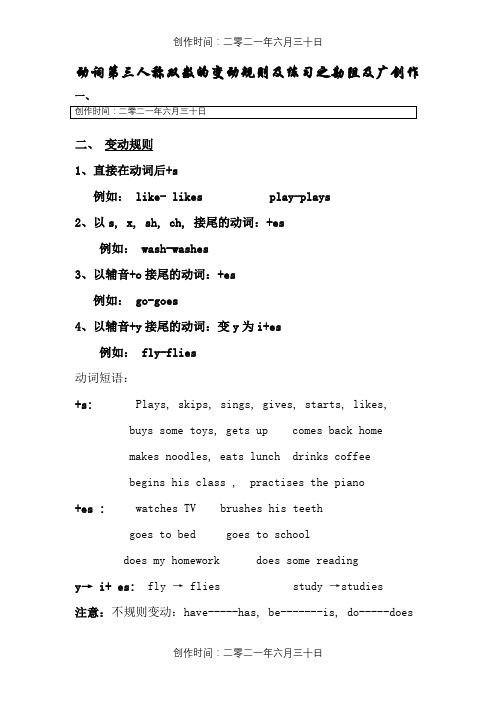
动词第三人称双数的变动规则及练习之勘阻及广创作一、二、变动规则1、直接在动词后+s例如: like- likes play-plays2、以s, x, sh, ch, 接尾的动词:+es例如: wash-washes3、以辅音+o接尾的动词:+es例如: go-goes4、以辅音+y接尾的动词:变y为i+es例如: fly-flies动词短语:+s: Plays, skips, sings, gives, starts, likes,buys some toys, gets up comes back homemakes noodles, eats lunch drinks coffeebegins his class , practises the piano+es : watches TV brushes his teethgoes to bed goes to schooldoes my homework does some readingy→ i+ es:fly → flies study →studies注意:不规则变动:have-----has, be-------is, do-----does写出下列动词的第三人称双数drink ________ go _______ stay ________ make ________ look _________ have_______ pass_______ carry ____ come________ watch______ plant_______ fly ________ study_______ brush________ do_________ teach_______二、请看下面两组句子, 注意区分他们的共同点和分歧点.I go to school every day.I don't go to school every day.He goes to school every day.He doesn't go to school every day.Do you go to school every day?Yes, I do. (No, I don't)Does he go to school every day?Yes, he does. (No, he doesn't)注:1)第三人称双数用了 does 后面就不用动词的s形式了,而用动词原形..2)酿成疑问句,要在句首加"do" does ; 酿成否定句, 要在动词前面加"do not ,does not", 可以简写为 "don't", doesn’t.课堂练习一一、把下列句子改成一般疑问句并做肯定、否定回答.1.I usually get up at six o’clock.Do you usually get up at six ?Yes, I do . /No, I don’t .2. We usually write e-mails on Saturday evening?Yes, No,3. They have the same hobby.?Yes, No,4. Suhai and Su yang like listening to music after school.?Yes, No,5. Helen usually watches TV in the evening.?Yes, No,二、否定句:在动词前+doesn't或don't.1. She_____ _____(do)her homework every day.2. He_____ _____(live)in Huanggang.3. The girl_____ _____(look)out of the window and sees many birds in the sky.4. Jenny runs home and_____ _____(sit)on the chair.三、一般疑问句:1._____the desk_____(have)four legs? Yes, it does.2._____she____(do)her homework every day?Yes, she does.3._____he_____(live)in Huanggang? No, he doesn't.4. Does Danny_____(see)the apple tree?四、依照要求改写句子:1. I do my homework every day.(改为一般疑问句, 作否定回答) ________________________________________________________2. She likes milk.(改为一般疑问句, 作肯定回答) ____________________________________________________________3. Amy likes playing computer games.(改为一般疑问句, 作否定回答) ___________________________________________________4. We go to school every morning.(改为否定句) _______________________________________________________5. I like taking photos in the park.(对划线部份提问) ________________________________________________________6. John comes from Canada.(对划线部份提问) ___________________________________________________7. Simon and Daniel like going skating.(改为否定句) ___________________________________________________五、改错(划犯毛病的处所, 将正确的写在横线上)1. Is your brother speak English? __________________2. Does he like going fishing? __________________3. He likes play games after class. __________________4. Mr. Wu teaches us English. _________________ _5. She doesn’t do her homework on Sundays. _________________课堂练习二一、写出所给词的第三人称双数形式sit swim read make runwrite havego do watch cry study play say wash二、用do或does的适当形式填空1. _____ you ride a bike to school? Yes, I ________.2. ______ your sister like PE? No, she ________.3. What_______ the students have? They have some pens.4. How_______ Linda go to school? She goes to school onfoot.5. He _______ not speak English. He speaks Chinese.6. _______ they watch TV on Sundays? Yes, they _______.7. My father and mother ______ not read newspapers on Saturday.三、句型转换1. I go to school by bus. (用He做主语变否定句)________________________________________2. Kim plays baseball very well. (变一般疑问句)________________________________________3. David doesn’t like learning French. (变肯定句)________________________________________4. Alan doesn’t watch TV on school nights. (变肯定句) ________________________________________5. We have enough time to do it. (变否定句)________________________________________6. Snoopy has a car. (对划线部份提问)______________________________________________________________ 7. Do you have a pencil? (把主语改成she)________________________________________________________________四、动词的适当形式填空Jim’s father (work) in a bank.He (go) to work by bus every morning, sometimeshe (ride) his bike.But he (be) never late for work. He (work) very hard.Jim (like) his father very much. They often (play)badminton(羽毛球)in front of their house, sometimes they (play) table tennis in Jim’sschool.Jim (like) to talk with his father. His father (like) to hear Jim talking about his friends and hisschool. On Saturday or Sunday, they often (play)on the computer. Jim (have) many computergames. But he doesn’t (play) them every day. Healso (work) hard at his lessons.。
- 1、下载文档前请自行甄别文档内容的完整性,平台不提供额外的编辑、内容补充、找答案等附加服务。
- 2、"仅部分预览"的文档,不可在线预览部分如存在完整性等问题,可反馈申请退款(可完整预览的文档不适用该条件!)。
- 3、如文档侵犯您的权益,请联系客服反馈,我们会尽快为您处理(人工客服工作时间:9:00-18:30)。
PRESENT SIMPLE
SPELLING RULES
Some verbs have present simple
spelling changes with ‘he’, ‘she’ and
‘it’.
Write the he/ she/ it form of the verbs in the box in the correct columns.
carry enjoy hurry wash watch say fly destroy marry pay go do stay relax try
y -ies
_______________
_______________
_______________
_______________
+ -es
_____________
_____________
_____________
_____________
+ -s
_____________
_____________
_____________
_____________
1 Sarah studys/studies German at school. 11 The plane flies/flys low over the sea.
2 Mary visites/visits us twice a week. 12 Kate washess/washes her hair every day.
3 I hope my elder brother passes /pasies the exam. 13 My mother bakes/ bakess cakes every Sunday.
4 Dad always teaches/teacheis me new things. 14 John lives/livs in the city most of the year.
5 I don’t/doesn’t live in the city. 15 He goes/gos to school at eight o’clock.
6 Sam often plaies/plays tennis. 16 The Sun doesn’t/dosn’t go round the Earth.
7 Jeremy carries/carrys my bag. 17 Peter watchies/watches TV every evening.
8 Ned takes/takies care of his mother. 18 Nick never crys/cries .
9 Mark always does/dos his homework. 19 He buies/buys a cup of coffee every morning.
Write the verbs in the present simple.
Mrs. Green 1___________ (hurry) to work every morning. She 2____________ (teach) Literature at the college in Bath. Mr. Green often 3_________ (go) with her and 4_____________ (carry) her bag. She always has a big bag full of books and her husband 5____________ (worry) about her back.
From time to time Mrs. Green 6__________ (go) to London for a few days for her work. Her mother
7__________ (stay) with her daughter’s family, as the Greens have three children. Their grandmother
8___________ (make) their food, 9 ___________ (wash) their clothes and 10 _________ (tidy) the house. She also 11 __________ (play) with her grandchildren or 12 _________ (watch) TV with them.
Mrs. Green isn’t happy in London. She 13 ___________ (enjoy) her work but she 14 ____________ (say) she 15_____________ (miss) her family a lot.。
